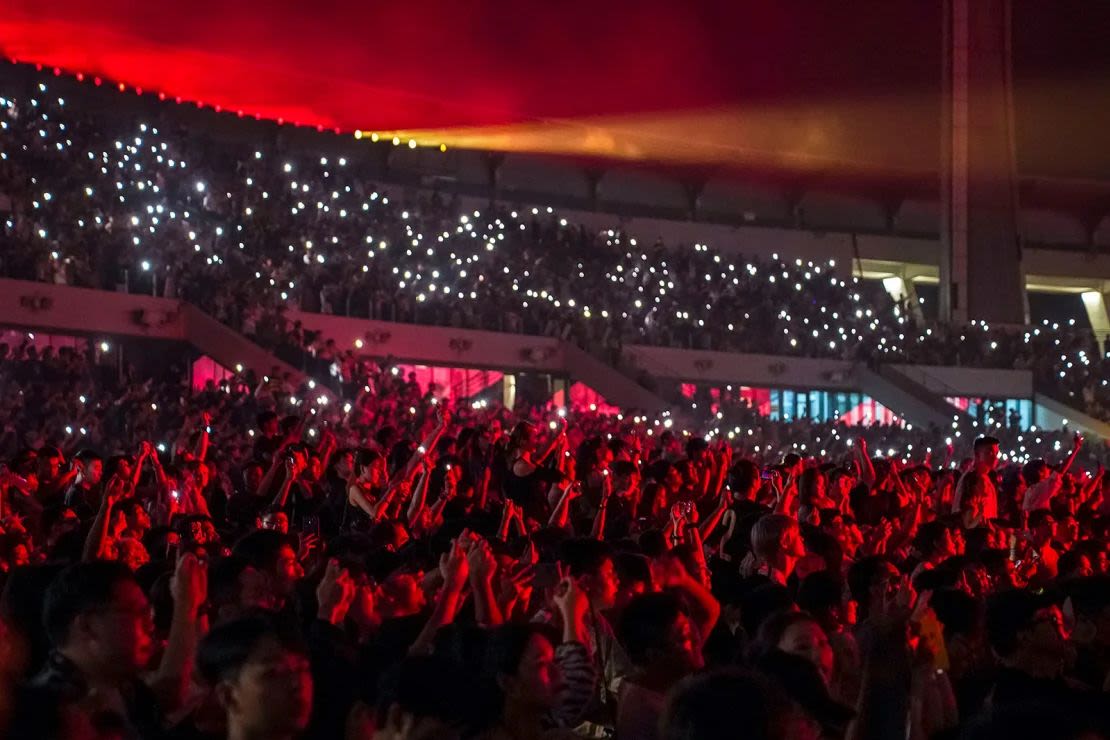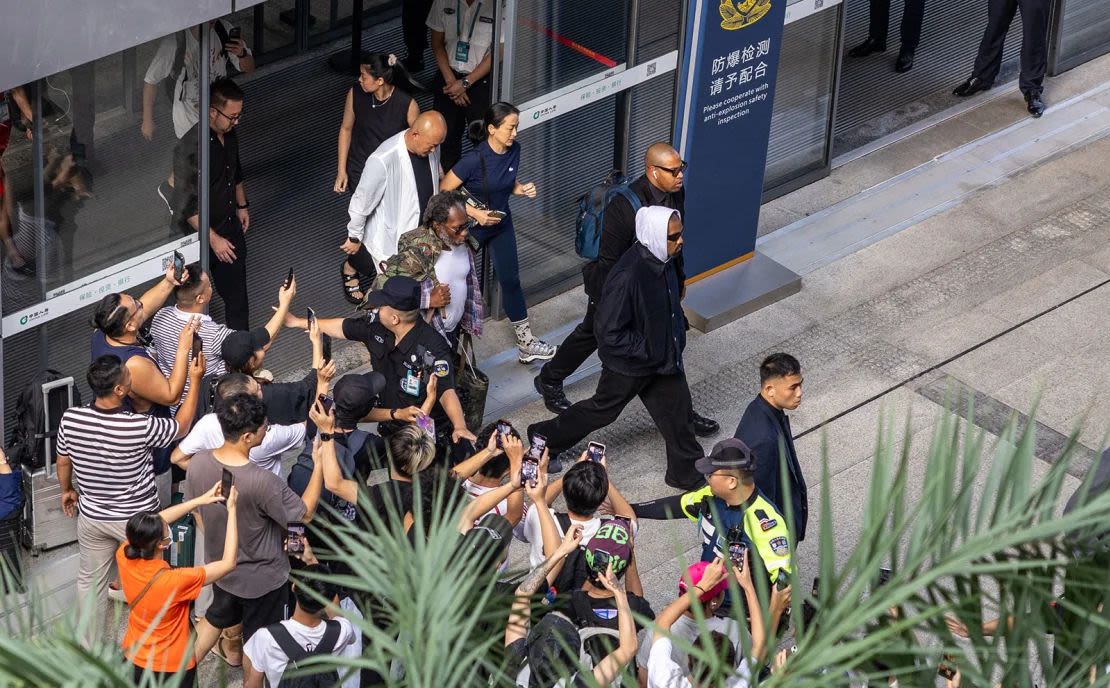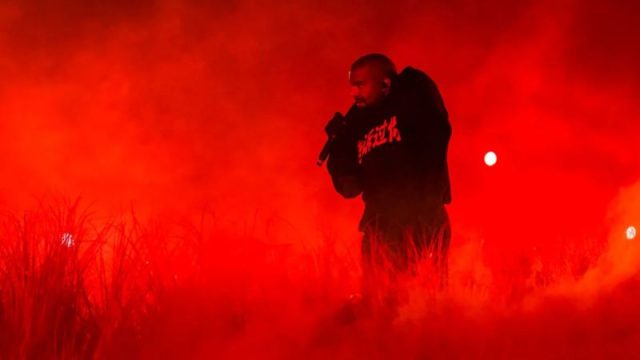(CNN) – Kanye West launching his new music seemed like an unlikely scenario.
But last month, the American rapper – now known as Ye – held not one, but two sold-out “listening parties” in China, which imposes some of the world’s strictest censorship.
Ye held his first concert in 16 years on the southern Chinese island of Hainan and stunned fans by announcing his new album “Bully”. Some wondered why the country’s ruling Communist Party would allow such a controversial artist to perform.
Six years ago, Chinese officials He took action Cracking down on hip-hop, banning songs and removing rappers from shows. Its media regulatory body banned Chinese television from featuring “actors with tattoos who are (or represent) hip-hop culture, subculture, and immoral culture.” A Chinese rapper, PG is oneI also apologized for some of the lyrics that glorified drugs and sex.
Along with his social and political commentary, Yeh has made many controversial statements in his personal life, with his frequent lyric references to sex and drugs. He wore a “White Lives Matter” T-shirt in public, and an anti-Semitic outburst caused his loss. A lucrative deal Sports shoes with the German brand Adidas.
However, he was able to present his “Vulture Listening Experience” on September 15th and 28th at the Wuyuan River Sports Stadium in Haikou, the capital of Hainan Province, which has over 41,000 seats.
The artist is part of a growing number of Western artists returning to the world’s second-largest economy since the lifting of restrictions imposed by Covid-19.
China’s Communist Party, which views popular culture as a key ideological battleground, has long kept the entertainment industry under strict censorship. But it encouraged its growth, especially in domestic industries such as film and music, which often used them to incite patriotism.

Under Chinese President Xi Jinping, the party has focused more on ideological and cultural control. Star’s daze and frenzy frenzy They are increasingly seen as a dangerous and damaging influence, especially among the country’s youth.
In 2021, the party cracked down on the Chinese entertainment industry and what it called “toxic” popular culture, accusing it of “perpetuating false values” among Chinese youth.
Experts say Yeh’s performances will mark a turning point. “He’s allowed Western artists to perform in China to send a signal that they’re welcome if they follow local regulations,” said Chen Tan, an associate professor in the political science department at the University of Richmond.
Other American megastars have also recently set their sights on China.
Mariah Carey performed twice in Beijing in September and shared X-rated photos from her visit to the Great Wall of China with her kids. John Legend also performed in Beijing and Shanghai in October.
American singer Charlie Puth will perform in China in early December.
According to Chen, allowing these Western stars is a way for Beijing to boost consumer spending as it seeks to revive an economy battered by high youth unemployment, a lingering housing crisis and subdued consumer confidence.
In recent weeks, the country has released a series of Stimulating measuresLike lending more money to commercial banks and making loans cheaper. The government also announced cash assistance to the most disadvantaged citizens and promised grants to recent graduates struggling to find work.
“The main motivation for recognizing Kanye West’s performance may be commercial, meaning the reactivation of the cultural and tourism industry,” Chen said. “China needs business revival and more cultural exchange.”
Chinese state media boasted of the economic benefits Ye’s concerts have brought to the tropical island, praising the rapper for “not only driving his fans, but also sparking a resurgence in the local holiday tourism economy.”
All the fans who attended his first concert came from outside the province, with the largest ticket sales recorded in major cities such as Shanghai and Beijing, state-run China Daily reported.
Ye’s first performance coincided with the first day of the Mid-Autumn Festival holiday, and the average hotel occupancy rate in Haikou jumped to 83%, about half from the same holiday last year. According to state news agency Xinhua, the passengers generated 373 million yuan ($52.6 million) in tourism revenue for the port city.

China’s booming music market represents a huge opportunity for artists and labels to expand their audience and generate revenue, and for domestic companies looking to capitalize on the growth.
The Chinese music market is the fastest growing in the world and will become the fifth largest in the world by 2022. According to IFPITrade organization for the recorded music industry. Recorded music revenue in China is set to rise 28.4% in 2022, compared with a 9% increase for the global market, IFPI said.
But accepting concerts by foreign artists is a conundrum for Beijing.
“Local governments always want more concerts and activities to boost the local economy,” said Hung Ho-Fung, a professor of sociology at Johns Hopkins University.
However, despite strong economic incentives to enter the Chinese market, the country’s strict censorship and heavy monitoring of performances, including last-minute cancellations of performances, have caused difficulties for artists in the past.
In 2015, two controversial American rock groups –Bon Jovi Y Maroon 5– Their scheduled shows in Beijing and Shanghai were suddenly cancelled.
Bon Jovi’s representatives did not respond to media inquiries at the time, but social media users speculated that the decision was due to the band’s 2009 video for “We Were Not Born to Follow,” in which images of the 1989 pro-democracy protests in Beijing’s Tiananmen Square appeared, a taboo subject for the Chinese government. Others point to a 2010 Bon Jovi concert in Tokyo in which images of the Dalai Lama, a staunch opponent of Beijing, appeared in the background of the stage.
In the case of Maroon 5, no official reason was given, but many speculated that the permits were revoked after a member of the group wished the Dalai Lama on social media on his birthday.
Similarly, promoters Oasis were forced to cancel their shows in 2009 after authorities discovered that a member of the British rock band had played at a Tibet independence concert. The rest of the band’s Asian tour went as planned, including a concert in Hong Kong.
Other American musicians Justin Bieber, Jay-Z and Lady Gaga have been banned from entering China.
The Chinese Ministry of Culture announced in 2015, without going into details, that Bieber “engaged in a series of bad behaviors in his social life and during a previous performance in China.”
American rapper Jay-Z’s first concert in 2006 was canceled because the Ministry of Culture “decided to protect the city’s hip-hop fans from unsavory lyrics about pimps, guns and drugs,” according to China’s state newspaper.
Some Chinese analysts and fans have speculated that he may have received permission to perform in Hainan due to his brief stay in China as a child. According to China Daily, the rapper lived in the eastern Chinese city of Nanjing for a year while his mother taught at Nanjing University.
“Kanye West’s childhood experience in Nanjing may have made him a welcome artist in China,” said Chen of the University of Richmond.
Johns Hopkins’ Ho said it’s too early to know whether progress by Ye and others in China will encourage more artists to play there.
Logistical challenges, such as obtaining visas, permits, and official approval, play a major role in the decision-making process of bands and their managers, who worry about the backlash of having to self-censor and hold a show that is spontaneous.
“This increasingly strict scrutiny, combined with a sluggish economy, means many foreign artists are choosing not to bother and avoid China,” he said.
But he added: “If the recent stimulus works and leads to a real and sustained recovery in consumption, the calculus of Western artists may change and they may be willing to take the trouble and the risk.”





